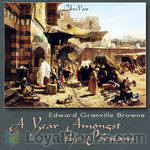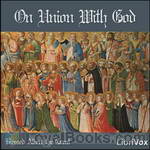|
Books Should Be Free Loyal Books Free Public Domain Audiobooks & eBook Downloads |
|
|
Books Should Be Free Loyal Books Free Public Domain Audiobooks & eBook Downloads |
|
Philosophy Books |
|---|
|
Book type:
Sort by:
View by:
|
By: Charles F. Dole | |
|---|---|
 The Coming People
The Coming People
Dole briefly sketches the history of life, and shows how it has a definite direction - toward the survival of the kind and gentle people. It's a challenging, and quite persuasive argument, and also a much needed one in light of the dog-eat-dog theories out there. Dole shows that in our evolving society, our traditional understanding of "survival of the fittest" needs to be updated. A book that was way ahead of its time, yet so suited to it. Some may argue that - since he was writing The Coming People before the first two world wars - that he was obviously wrong... | |
By: Edward Granville Browne | |
|---|---|
 A year amongst the Persians; impressions as to the life, character, and thought
A year amongst the Persians; impressions as to the life, character, and thought
Edward Granville Browne (1862 – 1926), born in Stouts Hill, Uley, Gloucestershire, England, was a British orientalist who published numerous articles and books of academic value, mainly in the areas of history and literature. His works are respected for their scholarship, uniqueness, and style. He published in areas which few other Western scholars had explored to any sufficient degree. He used a language and style that showed high respect for everybody, even toward those he personally did not view in positive light... | |
By: William Godwin (1756-1836) | |
|---|---|
 Thoughts on Man, His Nature, Productions and Discoveries
Thoughts on Man, His Nature, Productions and Discoveries
| |
By: George Edward Moore | |
|---|---|
 Principia Ethica
Principia Ethica
George Edward Moore, usually known as G. E. Moore, (1873 – 1958) was a distinguished and influential English philosopher. He was, with Bertrand Russell, Ludwig Wittgenstein, and (before them) Gottlob Frege, one of the founders of the analytic tradition in philosophy. Principia Ethica is one of the standard texts of modern ethics. | |
By: George Douglas Watson (1845-1924) | |
|---|---|
 Soul Food
Soul Food
A guide for Christians to walk a godly life. Covering various practical and spiritual topics. | |
By: Albertus Magnus (1193-1280) | |
|---|---|
 On Union With God
On Union With God
Surely the most deeply-rooted need of the human soul, its purest aspiration, is for the closest possible union with God. As one turns over the pages of this little work, written by Blessed Albert the Great towards the end of his life, when that great soul had ripened and matured, one feels that here indeed is the ideal of one's hopes. (From the Preface) | |
By: F. Max Müller (1823-1900) | |
|---|---|
 The Silesian Horseherd - Questions of the Hour
The Silesian Horseherd - Questions of the Hour
| |
By: Philip Stanhope, 4th Earl of Chesterfield | |
|---|---|
 Letters to His Son on the Art of Becoming a Man of the World and a Gentleman
Letters to His Son on the Art of Becoming a Man of the World and a Gentleman
Philip Stanhope, Earl of Chesterfield, was at one time Ambassador to the Hague, negotiated the second Treaty of Vienna, was a founding governor of London’s Foundling Hospital, Lord-Lieutenant of Ireland, and Secretary of State. Having no legitimate children, his heir was his third cousin (another Philip) whom he adopted. Although known as a hard, calculating man, he is most well known for his letters to his natural son (i.e., illegitimate son) (also called Philip). When Philip died in 1768, the letters are addressed to his grandchildren (Philip’s two sons, Charles, and, yes, Philip!)... | |
By: John Toland (1670-1722) | |
|---|---|
|
Pantheisticon: or, the Form Of Celebrating the Socratic-Society. Divided into Three Parts. Which Contain, I. The Morals and Axioms of the Pantheists; or the Brotherhood. II. Their Deity and Philosophy. III. Their Liberty, and a Law, neither deceiving, nor to be deceived. To which is prefix’d a Discourse upon the Antient and Modern Societies of the Learned, as also upon the Infinite and Eternal Universe. And subjoined, a short dissertation upon a Two-fold Philosophy of the Pantheists, that is to be followed; together with an Idea of the best and most accomplished Man... | |
By: Flavius Philostratus | |
|---|---|
 The Life of Apollonius of Tyana
The Life of Apollonius of Tyana
Apollonius of Tyana (ca. 40-120 AD) was a Greek Pythagorean philosopher and teacher. He hailed from the town of Tyana in the Roman province of Cappadocia in Asia Minor. His date of birth is a matter of conjecture as some say he was roughly a contemporary of Jesus.After Apollonius' death his name remained famous among philosophers and occultists. In a "novelistic invention" inserted in the Historia Augusta, Aurelian, at the siege of Tyana in 272, was said to have experienced a visionary dream in which Aurelian claimed to have seen Apollonius speak to him, beseeching him to spare the city of his birth... | |
By: Bhakti Seva | |
|---|---|
 The Hindu Book of Astrology
The Hindu Book of Astrology
Each person is born in or under one of the twelve signs of the Zodiac and is thus influenced throughout life by the planetary conditions at their time of birth. By referring to your sign, which is indicated by your date and month of birth you can determine your natural tendencies and what is best for you to attract. No matter what one of the twelve signs of the Zodiac you are born under, you can develop into a good and successful person if you will pay strict attention to the golden truths printed in this book. (Bhakti Seva) | |
By: William C. Hunter | |
|---|---|
 Pep: Poise, Efficiency, Peace
Pep: Poise, Efficiency, Peace
Colonel William Crosbie Hunter was a businessman and self-help writer who was moderately popular in the early 20th century. His books set forth his personal philosophy on health, happiness, human relations, and success in the business world. Pep, billed as "A book of how's not why's for physical and mental efficiency," was published in 1914 and went through several editions. (Introduction by Pleonic) | |
By: Daniel Garrison Brinton (1837-1899) | |
|---|---|
 The Religious Sentiment Its Source and Aim: A Contribution to the Science and Philosophy of Religion
The Religious Sentiment Its Source and Aim: A Contribution to the Science and Philosophy of Religion
| |
By: Woodrow Wilson (1856-1924) | |
|---|---|
 On Being Human
On Being Human
| |
 When a Man Comes to Himself
When a Man Comes to Himself
| |
By: Clarence Darrow (1857-1938) | |
|---|---|
 Crime: Its Cause and Treatment
Crime: Its Cause and Treatment
Clarence Darrow was an American lawyer. He remains notable for his wit and agnosticism, which marked him as one of the most famous American lawyers and civil libertarians.In this book, Darrow expands on his lifelong contention that psychological, physical, and environmental influences—not a conscious choice between right and wrong—control human behavior. To my ears (the reader's), the author has a rather simplistic behaviourist view of human behaviour, but he argues his position with wonderful clarity... | |
By: John Harvey Kellogg (1852-1943) | |
|---|---|
 Plain Facts for Old and Young
Plain Facts for Old and Young
| |
By: Orison Swett Marden (1848-1924) | |
|---|---|
 Cheerfulness as a Life Power
Cheerfulness as a Life Power
| |
By: John Morley (1838-1923) | |
|---|---|
 Diderot and the Encyclopædists (Vol 1 of 2)
Diderot and the Encyclopædists (Vol 1 of 2)
| |
 Diderot and the Encyclopædists Volume II.
Diderot and the Encyclopædists Volume II.
| |
By: Abdu’l-Bahá ‘Abbás (1844-1921) | |
|---|---|
 Talks by Abdul Baha Given in Paris
Talks by Abdul Baha Given in Paris
“Much has already been written of the visit of Abdul Baha, Abbas Effendi, to Europe,” writes Lady Blomfield in her Preface to Paris Talks, “During his stay at Paris at 4, Avenue de Comoens, he gave short “Talks” each morning to those who crowded, eager to hear His Teaching. These listeners were of many Nationalities and types of thought, learned and unlearned, members of various religious sects, Theosophists and Agnostics, Materialists and Spiritualists, etc., etc. Abdul Baha spoke in Persian, which was translated into French... | |
By: J Hudson Taylor (1832-1905) | |
|---|---|
 Union and Communion - or Thoughts on the Song of Solomon
Union and Communion - or Thoughts on the Song of Solomon
This little book, whose design is to lead the devout Bible student into the Green Pastures of the Good Shepherd, thence to the Banqueting House of the King, and thence to the service of the Vineyard, is one of the abiding legacies of Mr. Hudson Taylor to the Church. In the power of an evident unction from the Holy One, he has been enabled herein to unfold in simplest language the deep truth of the believer's personal union with the Lord, which under symbol and imagery is the subject of The Song of Songs. (From the Foreword by J Stuart Holden). | |
By: Confucius (551 BCE-479 BCE) | |
|---|---|
 Confucian Analects
Confucian Analects
The Analects, or Lunyu (simplified Chinese: 论语; traditional Chinese: 論語; pinyin: Lún Yǔ; literally "Classified/Ordered Sayings"), also known as the Analects of Confucius, are considered a record of the words and acts of the central Chinese thinker and philosopher Confucius and his disciples, as well as the discussions they held. Written during the Spring and Autumn Period through the Warring States Period (ca. 475 BC - 221 BC), the Analects is the representative work of Confucianism and continues to have a substantial influence on Chinese and East Asian thought and values today... | |
By: Patanjali | |
|---|---|
 The Yoga Sutras of Patanjali
The Yoga Sutras of Patanjali
Yoga sutras by Patanjali is a seminal work in yoga, this book is more about control of mind and the true goal of yoga. The sutras are extremely brief, and the translation in neat English makes it very easy for people to understand the ancient Sanskrit text. It starts with the birth and growth of spiritual man through the control of mind. In all, this is a "all in one" book for yoga philosophy written by the master himself. | |
By: Philip Dormer Stanhope Chesterfield (1694-1773) | |
|---|---|
 Quotes and Images from Chesterfield's Letters to His Son
Quotes and Images from Chesterfield's Letters to His Son
| |
By: Vernon Lee (1856-1935) | |
|---|---|
 The Beautiful An Introduction to Psychological Aesthetics
The Beautiful An Introduction to Psychological Aesthetics
| |
By: Pierre-Joseph Proudhon (1809-1865) | |
|---|---|
 System of Economical Contradictions; or, the Philosophy of Misery
System of Economical Contradictions; or, the Philosophy of Misery
| |
By: John Fiske (1842-1901) | |
|---|---|
 The Destiny of Man Viewed in the Light of His Origin
The Destiny of Man Viewed in the Light of His Origin
| |
By: William A. Alcott (1798-1859) | |
|---|---|
 The Young Man's Guide
The Young Man's Guide
| |
By: William A Alcott (1798-1859) | |
|---|---|
 Young Woman's Guide to Excellence
Young Woman's Guide to Excellence
Much of this guide for young women is still valuable today. Despite mentions of tight lacing and other out of date matters, it contains many timeless principles. (Bria Snow) | |
By: Mary Wood-Allen (1841-1908) | |
|---|---|
 What a Young Woman Ought to Know
What a Young Woman Ought to Know
| |